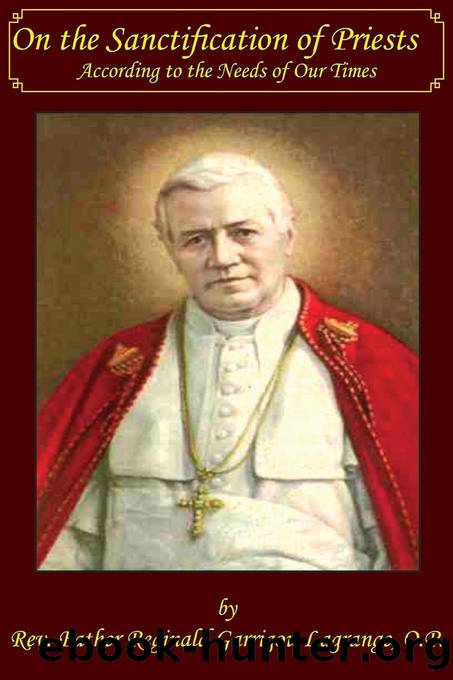On the Sanctifications of Priests According to the Needs of Our TImes by Rev. Fr. Reginald Garrigou-Lagrange

Author:Rev. Fr. Reginald Garrigou-Lagrange [Garrigou-Lagrange, Rev. Fr. Reginald]
Language: eng
Format: azw3
ISBN: 9780988372399
Publisher: Dolorosa Press
Published: 2013-12-13T00:00:00+00:00
Hence a bishop is not bound in conscience to already be perfect, with a perfection properly so-called, which consists in so great a charity that a man would always adhere to God and would always deliberately act from charity, excluding deliberate venial sins and voluntary imperfections. For that reason it is said concerning a bishop: âBecause he himself also is compassed with infirmity and therefore he ought, as for the people, so also for himself to offerâ (Hebrews 5:2-3).
Therefore Passerini speaks correctly. â This first part of our thesis is confirmed from this that it is taught by St. Thomas: Whether he that is appointed to the episcopate ought to be better than others? St. Thomas replies with canon law: it suffices to choose a good man, nor is it necessary to choose a better man. And he explains, saying: âHe who has to choose or appoint one for a bishop is not bound to take one who is best simply, i.e. according to charity, but one who is best for governing⦠On the part of the person appointed, it is not required that he esteem himself better than others, for this would be proud and presumptuous; but it suffices that he perceive nothing in himself which would make it unlawful for him to take up the office of prelateâ (q. 185, a. 3).
In his reply to the third objection he writes: âNothing hinders one from being more fitted for the office of governing, who does not excel in the grace of holiness.â As it is said: âThere are diversities of graces, and of ministries, and of operationsâ (1 Cor. 12).
The second part of the thesis: Nevertheless, a bishop by reason of his office and state is more obliged to tend to perfection properly so-called, than a religious, and by holier means (Passerini, p. 74; cf. St. Thomas, q. 185, a.3 ad 2: âA bishop ought to aim at showing himself to be more excellent than others in both knowledge and holinessâ). A bishop, just as a religious, ought to aim at perfection without measure in respect to the end, for perfection consists in the perfect observance of the precept of charity, which precept is without measure. And in this respect, as Passerini rightly says (p. 71, n. 6), the state of perfection does not allow differentiation. But:
Download
This site does not store any files on its server. We only index and link to content provided by other sites. Please contact the content providers to delete copyright contents if any and email us, we'll remove relevant links or contents immediately.
Christian Ethics by Wilkens Steve;(854)
Christian Ethics for a Digital Society by Kate Ott(778)
Fearfully and Wonderfully Made by Philip Yancey & Paul Brand(769)
God and the Multiverse by Victor J. Stenger(672)
Numbers by Ronald B. Allen(632)
How to Read Slowly by James W. Sire(613)
Christian Ethics: An Introduction to Biblical Moral Reasoning by Wayne Grudem(597)
The City of God by Saint Augustine & Marcus Dods(577)
Monastic Archaeology by Unknown(564)
Morality by Jonathan Sacks(564)
The Technological System by Jacques Ellul(543)
Amish Grace by Donald B. Kraybill & Nolt Steven M. & Weaver-Zercher David L(531)
Death of the Doctor by Unknown(525)
The Disabled Church by Rebecca F. Spurrier;(521)
Jesus: A New Vision by Whitley Strieber(518)
Children of Lucifer; The Origins of Modern Religious Satanism by Ruben van Luijk(505)
Critical Writings by Joyce James;(499)
Redeeming Sociology by Vern S. Poythress(485)
The Church in the Early Middle Ages by G.R. Evans(476)
